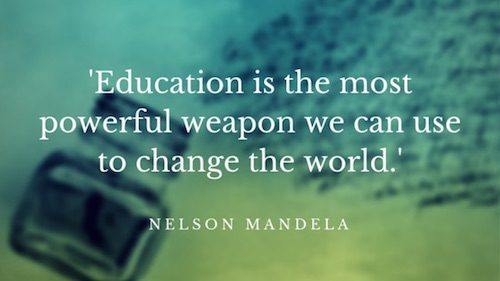Maths has been described as “the language with which God has written the universe” (Galileo, 1564-1642).
During my time at school, I probably would have turned my nose up at this quote and disagreed with it. Although, this was probably because I hated maths at school, but didn’t everyone? After taking the Discovering Mathematics module this year however, I have noticed that mathematics truly is at the heart of everything that we do. Whether it is as simple as telling the time or as complex as working out the sale price of a pair of jeans in Topshop, we constantly use maths in our everyday lives.
The Scottish Curriculum for Excellence (2016) states that “mathematics is important in our everyday life, allowing us to make sense of the world around us and to manage our lives”. Furthermore, the Curriculum’s principles and practice documents also explain, that mathematics is crucial because it is implemented and used throughout the whole curriculum. For example, in art and music you use patterns, sequencing and symmetry and in science you are often using graphs and charts when it comes to experiments. Moreover, maths is also used in health and wellbeing, modern languages, design and technology, and ICT (CfE, 2016). In addition to this, Haylock (2014, p286) states that “mathematics provides us with knowledge and skills that are valuable not just for their own sake but because we can apply them to situations in real life and across the curriculum”. It is therefore crucial that we as teachers encourage children to engage with maths in all its purest forms. It is important that children not only learn maths within the classroom, but also outside the classroom.
Education through play is a great way for children to take the mathematical skills which they have learnt in the classroom, and use them in their everyday lives. Edwards (1998) states that both children and adults learn better when they are interested and motivated to learn, as this makes learning a purposeful and pleasurable experience. She goes on to state, that the presentation of mathematics through play is a great way to sustain the motivation and interest of the children. In my MA1 placement class, they had active maths once a week, where the children used the mathematical skills which they had learnt recently, for example percentages and decimals, and applied them to game like situations. I was in charge of organising and creating the games during my placement. I would create my own board games and crosswords etc. for the children. Doing this highlighted to me the importance of play involved with learning, especially within mathematics as it helps the children to put the skills which they have learnt into real life situations and contexts.
The following TED Talk by Jim Patrick, a budding mathematician at the young age of 6, explains the importance of maths and how we use maths in our everyday lives.
References
Curriculum for Excellence: Mathematics Principles and Practices. (2016). [ebook] Education Scotland, pp.1-4. Available at: https://education.gov.scot/Documents/mathematics-pp.pdf [Accessed 13 Nov. 2017].
Edwards, S. (1998). Managing effective teaching of mathematics 3-8. London: Paul Chapman, pp.2-7.
Haylock, D. and Cockburn, A. (2014). Understanding mathematics for young children. 4th ed. Los Angeles [u.a.]: Sage, pp.286-291.

